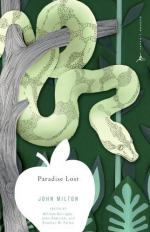|
|
Paradise Lost Topic Tracking: Obedience & Disobedience
Book 1
Obedience & Disobedience 1: Milton asks the muse to sing about man's first disobedience: when man ate from the Tree of Knowledge. Rather than ask the muse to sing of the fall of Adam and Eve, Milton interestingly stresses "disobedience."
Book 2
Obedience & Disobedience 2: Sin agrees to unlock the gates for Satan and let him pass, telling him "thou art my father, thou my author, thou my being gav'st me; whom should I obey but thee, whom follow?" Book 2, lines 864-5. Sin reasons that she must obey Satan since he is her creator.
Book 3
Obedience & Disobedience 3: God predicts that Adam will eat the fruit of the forbidden Tree of Knowledge, which is the only rule Adam could break. The tree of knowledge is established as the means by which Adam can obey or disobey.
Book 4
Obedience & Disobedience 4: Satan hears Adam tell Eve that they must not eat of the Tree of Knowledge, calling it "the only sign of our obedience left" Book 4, line 428, or else God will kill them. This is Adam's reiteration of God's statement.
Obedience & Disobedience 5: Satan, having just learned that the Tree of Knowledge is forbidden to Adam and Eve, ponders "ignorance, is that their happy state,/ the proof of their obedience and their faith?" Book 4, lines 519-20. Satan equates obedience to God to ignorance. Adam and Eve, by refusing to eat the fruit, remain ignorant.
Obedience & Disobedience 6: Soon, Adam decides that it's time to go to bed, and Eve obliges, stating "my author and disposer, what thou bidd'st unargued I obey." Book 4, lines 635-6. Eve reasons that she must obey Adam since she was created from him. This parallels Sin's prior statement to Satan.
Book 5
Obedience & Disobedience 7: Adam asks what God's cautioning of obedience meant. Raphael explains how obedience is related to free will: if Adam errs, it is his choice. Free will allows Adam and Eve to choose to be obedient or disobedient.
Obedience & Disobedience 8: Satan assembled about 1/3 of the angels against God and his Son, since they wanted as few people as possible to obey God. Satan reiterates his feelings that he should not have to obey anyone, especially God.
Book 6
Obedience & Disobedience 9: Raphael explains that Satan and his followers were at a disadvantage by rebelling against God. God's followers had an advantage because they were innocent, and chose to resist Satan's temptation to revolt. Again, the vehicle for salvation is choosing obedience to God, and the vehicle for damnation is choosing disobedience to His rule.
Obedience & Disobedience 10: He tells Adam "warn thy weaker" (i.e., Eve), and "let it profit thee to have heard by terrible example the reward of disobedience." Book 6, line 909-11. This is ironic: the "reward" for disobedience is the punishment Satan received.
Book 7
Obedience & Disobedience 11: Milton makes his third invocation, this time to Urania, asking the goddess what caused Adam and Eve to "transgress, and slight that sole command, so easily obeyed amid the choice of all tastes else to please their appetite." Book 7, lines 47-9. Here, Milton reiterates how easy it was to obey that one simple command of not eating the forbidden fruit.
Obedience & Disobedience 12: After the people in this new world spend enough time being obedient, heaven and earth will become "one kingdom, joy and union without end." Book 7, line 161. God is testing not only Adam and Eve, but every mortal. If, through exercising free will, man is found to be obedient, he will reap the rewards of following God's wishes.
Obedience & Disobedience 13: The sixth day sees the creation of cattle and creeping things: beasts, bees, and most interestingly, the serpent that was not harmful, but obedient. This is an important moment in the poem: the serpent was good when it obeyed. Now that it has been afflicted with Satan's disobedience, it has become bad.
Book 8
Obedience & Disobedience 14: Adam is given Paradise to "till and keep," but he must not eat from the Tree of Knowledge. This is his pledge of obedience and faith. The Tree of Knowledge is the means by which Adam and Eve can either obey or disobey God's rule.
Book 9
Obedience & Disobedience 15: Milton informs the reader that he must "change these notes to tragic; foul distrust, and breach disloyal on the part of man, revolt and disobedience." Book 9, lines 5-8. Man has stopped obeying, so now his story will become unfortunate.




